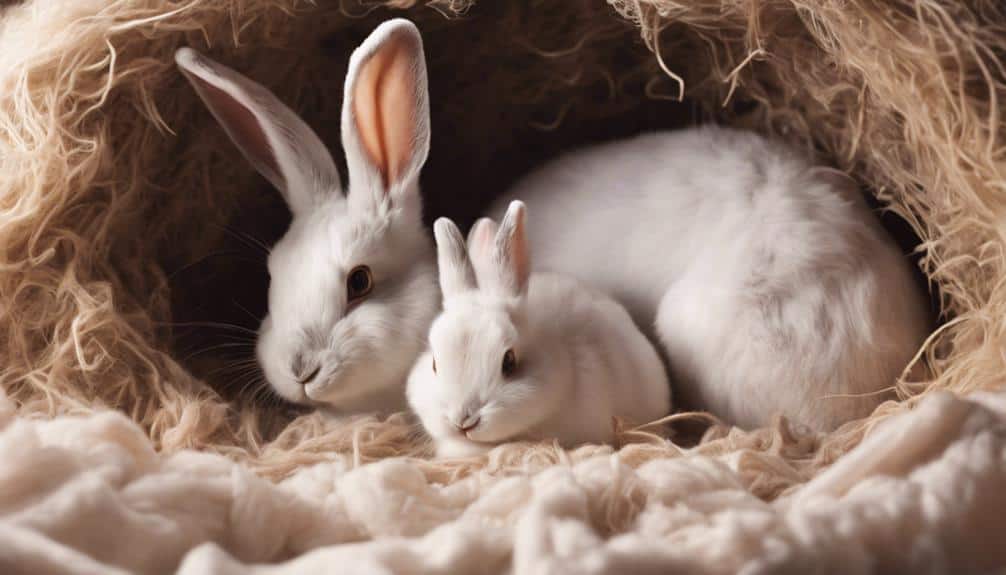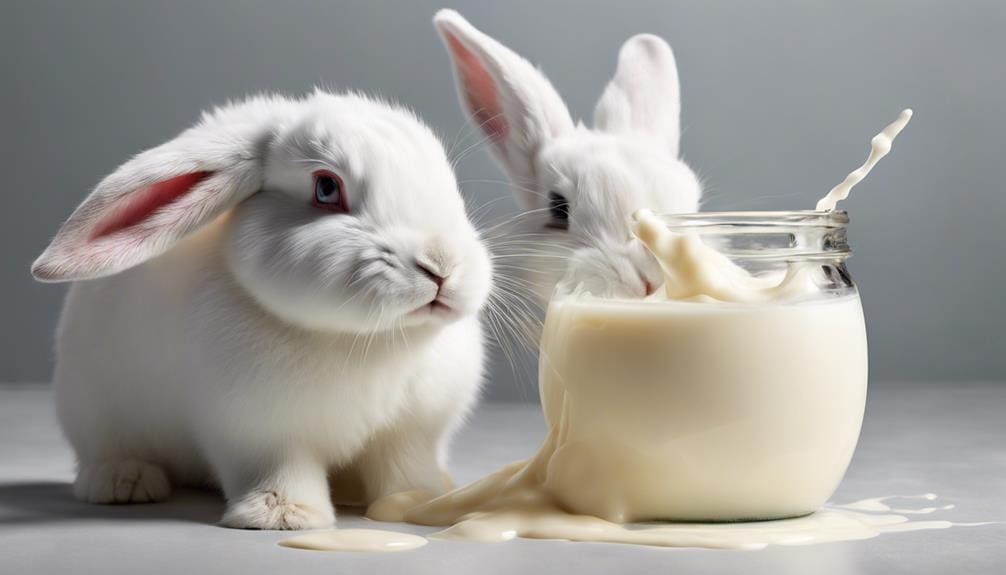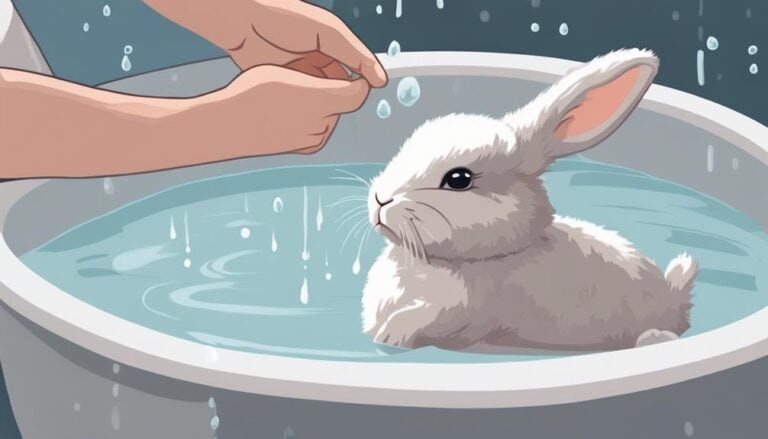Do bunnies breastfeed?
You might be surprised to learn about the fascinating nursing behaviors of these fluffy creatures.
Understanding how bunnies care for their young can offer insights into their unique maternal instincts and the delicate process of raising bunny kits.
Contents
- 1 Key Takeaways
- 2 Bunny Parenting Behaviors
- 3 Nursing Behavior in Bunnies
- 4 Maternal Care in Rabbits
- 5 Lactation Patterns in Bunnies
- 6 Bunny Milk Production
- 7 Bunny Infant Feeding Methods
- 8 Bunny Milk Composition
- 9 Bunny Weaning Process
- 10 Does Yawning in Bunnies Indicate a Need for Breastfeeding?
- 11 Frequently Asked Questions
- 12 Conclusion
Key Takeaways
- Mother rabbits breastfeed kittens once or twice a day, providing vital nutrients.
- Nursing sessions last 5-10 minutes, ensuring kits receive daily milk supply.
- Bunny milk rich in fat and protein, adjusting to kits' needs for growth.
- Monitoring lactation and feeding behaviors crucial for healthy, well-nourished kits.
Bunny Parenting Behaviors

Mother rabbits breastfeed their kittens once or twice a day to provide essential nutrition. These nursing sessions are important for the well-being of the offspring, as they typically last 5-10 minutes, providing all the necessary milk supply for the day. It's essential to monitor the mother's lactation and the feeding behaviors of the kittens to guarantee they're receiving adequate nourishment. Healthy kittens can be identified by their round bellies after nursing, indicating proper feeding.
Mother rabbits instinctively avoid staying with their offspring for extended periods to protect them from predators. Despite this behavior, they're attentive during nursing sessions, ensuring that their kittens receive the necessary nutrients. By understanding these bunny parenting behaviors, caretakers can support the mother rabbit in providing the best care for her kittens. Monitoring the nursing sessions and the overall well-being of the kittens is crucial in ensuring their healthy development.
Nursing Behavior in Bunnies
Understanding the nursing behavior in bunnies sheds light on how kits receive their essential nutrition and develop during their early stages of life. Mother rabbits nurse their babies once or twice a day in short 5-10 minute sessions. These feedings are vital as kits receive their entire daily milk supply during these times, ensuring they are well-fed and growing. Nursing typically starts shortly after birth, and the mother's milk sustains the babies for a full day. Healthy kits display round bellies after nursing, a clear sign that they are thriving. Mother rabbits, following their instincts, often avoid lingering near their offspring to protect them from predators. Here is a table summarizing nursing behavior in bunnies:
| Behavior | Description | Importance |
|---|---|---|
| Frequency of Nursing | Once or twice a day for 5-10 minutes per session | Ensures adequate feeding |
| Timing of Nursing | Typically starts the night after birth, providing sustenance for 24 hours | Essential for growth |
| Kit's Physical Indicator | Round bellies after nursing indicate they are well-fed and thriving | Health monitoring |
| Mother's Protective Instincts | Avoids lingering near the nest to prevent attracting predators | Ensures kit's safety |
Maternal Care in Rabbits

Mother rabbits display exceptional maternal care, feeding their kits once or twice daily in brief 5-10 minute sessions. Kits rely solely on these feedings for their entire day's nourishment, starting as soon as the night following birth.
Healthy kits are easily identified by their well-rounded bellies, evidence of receiving the essential sustenance provided by their mother.
Nursing Behavior in Rabbits
During nursing sessions, baby bunnies receive their entire day's milk supply from their mother rabbits in short periods lasting 5-10 minutes. This feeding schedule guarantees that the kits get the necessary nutrients to thrive. The first nursing session usually takes place the night after the babies are born, and from then on, the mother rabbit will nurse once or twice a day. Rabbits' milk provides sustenance for the baby bunnies for a full 24 hours, contributing to their round bellies, indicating they are well-fed. The nursing sessions are vital for the development and growth of the young rabbits. Below is a table summarizing the nursing behavior in rabbits:
| Nursing Behavior in Rabbits | Facts |
|---|---|
| Feeding Schedule | 1-2 times a day |
| Milk Supply | Entire day's supply |
| Well-Fed Indicator | Round bellies after nursing |
Nesting Instincts of Rabbits
Nesting instincts in rabbits drive them to meticulously construct secure and cozy environments for their newborn kits, ensuring ideal warmth and protection. Mother rabbits display remarkable care and dedication in preparing for the arrival of their offspring. This behavior showcases their innate nurturing abilities and commitment to their young ones.
The use of hay, straw, and fur in nest-building reflects their attention to detail and desire to create a comfortable space for the kits. Witnessing a mother rabbit diligently arranging these materials highlights the depth of her maternal instincts, emphasizing the importance of providing a safe haven for her vulnerable newborns.
The nest becomes a sanctuary where the mother rabbit can nurture and protect her kits, showcasing the beauty of maternal care in the animal kingdom.
Lactation Patterns in Bunnies
Lactating rabbits typically nurse their kittens once or twice daily for short intervals, providing them with their entire day's milk supply during these sessions. Rabbit milk contains all the essential nutrition that the kits need, sustaining them for a full 24 hours.
The first nursing session usually takes place the night following birth, kickstarting the important feeding routine. Observing healthy kits after nursing reveals their round bellies, a sign that they've successfully received the necessary nourishment from their mother.
This instinctive care from mother rabbits guarantees that the kittens receive the proper care and sustenance required for their growth and development. Understanding these lactation patterns in bunnies is important for ensuring the well-being of the newborn kits, as it highlights the significance of consistent nursing sessions for their overall health and growth.
Bunny Milk Production
When mother rabbits give birth, they start producing milk to nourish their newborn kits. Bunny milk is packed with essential nutrients that sustain the babies for a full day.
Each feeding session provides the kits with their entire day's worth of milk, ensuring their growth and development.
Bunny Milk Composition
Bunny milk, rich in fat and protein, plays an important role in supporting the rapid growth of baby rabbits. This specialized rabbit milk contains antibodies that strengthen the immune system of the kittens, providing essential protection.
The nutrient-rich composition of bunny milk, including vital elements like calcium and vitamins, is essential for the development of young rabbits. As the baby bunnies grow, the milk's composition adjusts to meet their changing nutritional requirements.
Mother rabbits typically feed their offspring once or twice a day, ensuring that the kittens receive all the necessary nutrients for the development and health.
Nursing Behavior in Bunnies
During the first few weeks of a baby rabbit's life, the nursing behavior exhibited by mother rabbits plays an important role in providing essential nutrients through bunny milk production. Baby rabbits, known as kits, rely on their mother's milk for sustenance. Mother rabbits nurse their kits once or twice a day, ensuring they receive their entire day's milk supply during these short feeding sessions.
Bunny milk is essential for the growth and development of baby rabbits, sustaining them for 24 hours. In cases where orphaned baby rabbits need care, feeding them warm formula through bottle feeding becomes important. This nursing behavior is instinctual in rabbits, with mothers caring for their offspring by providing them with the necessary milk for their well-being.
Bunny Infant Feeding Methods
At a specific time each day, mother rabbits provide all the milk their kits need in one feeding session. This feeding time is essential for the well-being of the baby bunnies, ensuring they receive the necessary nourishment to grow and thrive.
Here are some essential points to contemplate regarding bunny infant feeding methods:
- Night Feeding: Mother rabbits feed their kits during the night, usually between midnight and 5:00 a.m., aligning with their natural behavior patterns for ideal care.
- Round Bellies: After nursing, healthy kits will showcase round bellies, indicating they've received an adequate amount of milk and care from the mother rabbit.
- Monitoring and Care: Keeping a close eye on the nest and the kits in the initial days of life is crucial. Ensuring all babies are alive and well-fed supports the mother's nursing behavior, leading to stronger, healthier, and potentially longer-lived offspring.
Bunny Milk Composition

High in fat and protein, bunny milk provides essential nutrients for the rapid growth of baby rabbits. This milk is vital for the development of their internal organs and helps them thrive. It contains antibodies that enhance the baby bunnies' immune systems, protecting them from illnesses. Along with fat and protein, bunny milk is rich in calcium and vitamins necessary for the baby bunnies' growth.
As the kits grow, the composition of the milk adjusts to meet their changing nutritional requirements. When caring for a baby bunny, make sure to feed them with the right nutrients found in bunny milk. You can find suitable milk replacers at pet supply stores or veterinarians' offices. It's important to feed the bunnies regularly with the appropriate formula, making sure it's warm and well-prepared.
Bunny Weaning Process
As baby bunnies reach 6-8 weeks of age, they gradually start the weaning process by nibbling on solid food and consuming their caecotrophs. This marks the beginning of their independence from their mother's milk. During this important stage, the weaning process plays a significant role in the health and development of the kits.
Here's how you can help facilitate a smooth change for the baby bunnies:
- Introduce Fresh Hay Daily: Providing fresh hay guarantees that the kits have a fiber-rich diet essential for their digestive health.
- Shift to a Solid Food Diet: Slowly introduce pellets and fresh greens to encourage the kits to develop a balanced diet.
- Gradual Separation for Mastitis Prevention: Gradually separating the kits from their mother helps prevent mastitis in the doe, ensuring the overall well-being of both the babies and the mother.
Does Yawning in Bunnies Indicate a Need for Breastfeeding?
Bunny yawning behavior explained: Yawning in bunnies does not necessarily indicate a need for breastfeeding. While baby bunnies may yawn to communicate hunger, adult bunnies often yawn as a sign of relaxation or boredom. It’s important to understand the specific context and body language of the bunny to interpret its behavior accurately.
Frequently Asked Questions
How Long Do Baby Rabbits Breastfeed?
During the weaning process, baby rabbits breastfeed for 5-10 minutes once a day. This feeding meets their nutritional requirements for the day. It aids in their growth milestones and occurs in litters. Maternal instincts guide bonding experiences, showing nesting behaviors.
How Does a Bunny Feed Her Babies?
To feed her babies, a bunny demonstrates remarkable maternal care by nursing once or twice daily. During brief feeding sessions, she provides all their daily milk needs. This validates proper growth and development for her little ones.
Do Mother Rabbits Nurse Their Babies?
Yes, mother rabbits nurse their babies to provide essential nourishment. They exhibit strong maternal instincts, ensuring proper milk production and the growth milestones of their young. This nurturing behavior fosters a deep bond through the suckle reflex.
How Do I Know if My Rabbit Is Nursing Her Babies?
To know if your rabbit is nursing her babies, observe for behavioral cues like frequent visits to the nest, check for round, full bellies in kits, and note if the mother spends limited bonding time with them.
Conclusion
Congratulations! You now know that bunnies indeed breastfeed their young, ensuring their nutrition and growth.
Despite their fluffy and adorable appearance, mother rabbits take their nursing responsibilities seriously, providing all the necessary care for their kits.
So next time you see a bunny, remember that behind those cute ears lies a dedicated parent ensuring the well-being of their offspring.
Nature truly is full of surprises!






